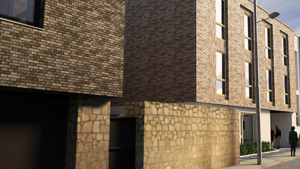Dublin City Council refuses planning permission for nun retirement accommodation

Gordon Deegan
Dublin City Council has refused planning permission to construct a 38-unit accommodation block for elderly members of religious orders in need of care.
The City Council has refused planning permission to Keith Craddock's Granville Developments Ltd for the three-storey residential accommodation at Haddington Place on a site to the rear of Sisters of the Holy Faith in Ballsbridge.
This came after the Department of Education and D4 locals objected to the block, which would have comprised of 38 en suite bedrooms.
The city council refused planning permission as the scheme would cause unacceptable levels of overspill vehicular activity on a narrow laneway, due to the proposed location being at a constrained infill site.
The council stated that the proposed development “would, therefore, endanger public safety by reason of a traffic hazard and obstruction of pedestrians, cyclists and other road users”.
The planning authority pointed out that Haddington Place is a key pedestrian/cyclist route providing access to two schools, and the proposed development would create an undesirable precedent for similar type development.
The council also refused planning permission as the lack of on-site car parking spaces for the proposed development would be seriously deficient and would be inadequate to cater for the parking demand generated.
The council also pointed out that the development is reliant on upgrades to the public road on Haddington Place to facilitate safe pedestrian access.
They state that the proposed development would endanger public safety by reason of traffic hazard, as it has not been demonstrated that safe pedestrian access to the proposed development will be provided.
Planning consultant for Granville Developments, Kevin Hughes, had told Dublin City Council that the proposal would “provide residential accommodation and care to members of religious orders in need of care”.
He said that the scheme "offers dedicated, supportive residential accommodation near existing religious properties, which is considered both appropriate and consistent with the policy of enabling people to age in place with dignity and independence”.
Mr Hughes stated that the proposed development “will deliver a high-quality addition to the existing religious, educational, and community uses around the site, and would not detract from the visual or residential amenities of the area”.
However, in one objection, Susan McCarrick, on behalf of the Pembroke Road Association, questioned who the nuns are, as religious communities typically provide a home for their retired members.
Ms McCarrick told the council, “that we are expected to accept and believe that there will be an unlimited supply of elderly nuns to take up residence is fanciful.”
Ms McCarrick further commented that “there are no views for residents to enjoy - just the back of other buildings. While the zoning is institutional, it does not have to be penitential”.
The Council received 11 submissions, and in a separate objection, the Dept of Education disclosed that it made a bid to purchase the site "to safeguard it for future educational use but was ultimately outbid”.
Asst Principal Officer at the Dept of Education’s Forward Planning & Site Acquisitions section, Deirdre Maher, stated that “the department regards the site as strategically important to the long-term provision of school facilities in the area”.
Requesting the Council to refuse planning permission, Ms Maher stated that it "is concerned that the loss of this site would undermine its ability to meet current and future educational needs in Dublin 4”.
Ms Maher stated that the site “represents one of the very few remaining opportunities to provide essential educational and community infrastructure in the locality, given the scarcity of available land”.






